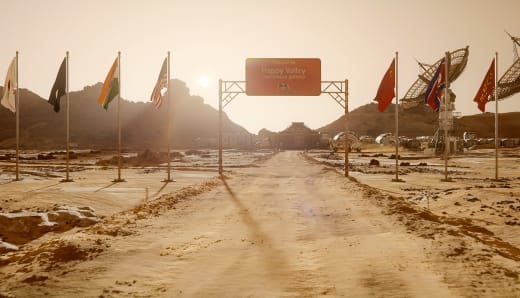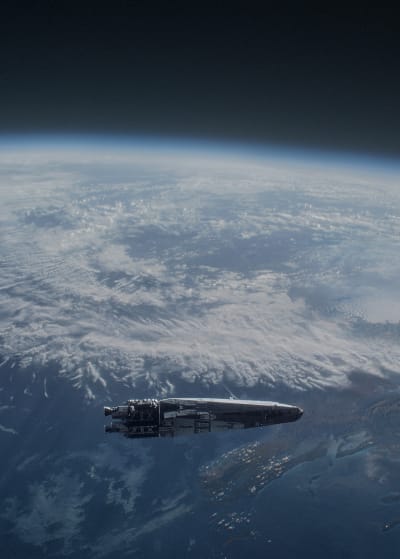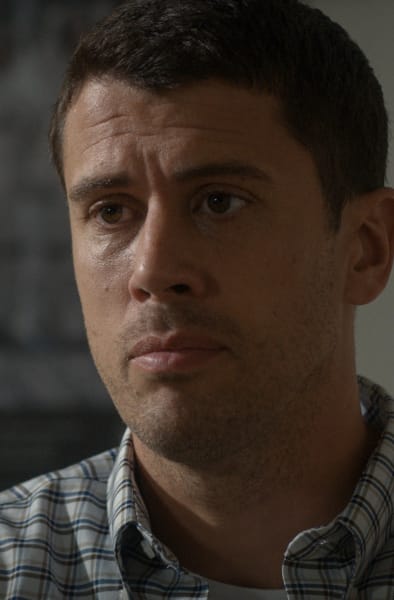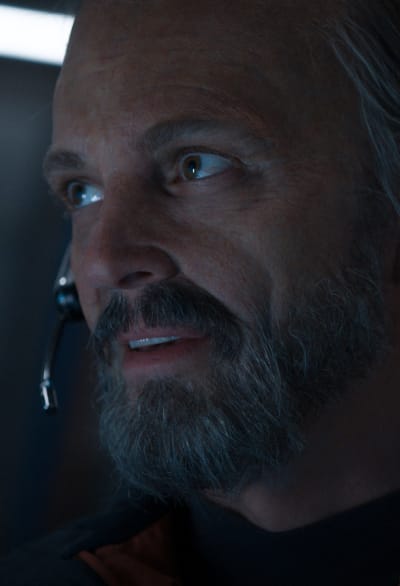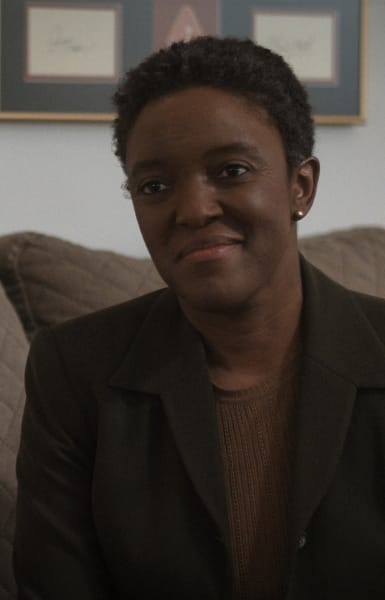The world has changed dramatically since the events of the third season, but to catch exactly how much, you need to pay close attention to the opening sequence that runs down the significant events of the past eight years.
For All Mankind Season 4 Episode 1 is indicative of the season as a whole, which foregoes the excitement of the exploratory phase of space travel to unravel the fact that the more things change, the more they stay the same.
As it turns out, no matter how technologically advanced the world becomes, the issues that plague us today are bound to resurface.
The opening sequence explains in short order how the world has advanced in the past eight years, but there is much left unsaid, which makes it somewhat difficult to understand why what’s happening is happening.
For example, in our interview with the wonderful people who bring For All Mankind to life, we learned that the world doesn’t rely on solar or wind power to free us from fossil fuels but nuclear fusion.
According to series creator Ronald D. Moore, “nuclear fusion is now a part of everyday life on Earth. It’s made profound changes in human society.”
From our perspective in the premiere, things aren’t much different in this alternate reality than they are in ours.
When it comes to life on Earth, the most significant change appears to be that the job industry is changing, and those who have the skills to consider a career on Mars do what they can to make it happen.
In our interviews with Moore, Maril Davis, Matt Wolpert, and Ben Nedivi, I tried to drill down into how they determine what to include in the series and what to cover quickly in the season preamble.
A lot of effort goes into determining the whys and hows of the time jump, but this format sometimes loses a narrative thrust because of it.
Miles is the face of the changing world for the everyman, but as a former oil rig worker, he’s hardly indicative of the plight of the average citizen.
Even the show’s title suggests that the small step of the astronauts was a giant step for mankind, but we’ve continued to explore, in general, life as it pertains to those in the space races rather than those who benefit from those advances.
The inclusion of civilians on Mars will shed some light on that, but it will mostly be in relation to Happy Valley. Even the Earth-bound segments rely entirely on the space race, which in some ways makes sense but, in others, is a bit of a letdown.
The main problem is that the world of For All Mankind Season 4 feels a little too much like our own, as if all of the progress in space has converged our timelines, just a little earlier in their world than ours.
If there’s one thing that I don’t want from my entertainment these days, it’s a reminder that all is not well in our world.
If you’re like me, your interest was piqued far more by the exciting but glossed-over previous eight years than it is by a civilian suffering and making a difficult choice to keep his family from poverty.
Who wouldn’t want to explore in depth an alternate reality in which John F. Kennedy, Jr. didn’t die in a plane crash and followed his family into politics or where a Republican candidate could become the first openly gay president of the United States?
The politics behind the worldbuilding are the driving force of the series as we know it. It’s an untapped well of potential bubbling just beneath the surface, but as the series progresses in decade increments between seasons, it will, by nature of the series, be explored only in passing.
The good news is that even when events converge and the focus is shifted, there is still much to celebrate about a series with as much history as this show has created for itself. Season 4 is the last hurrah for many of these characters, and their arcs are bound to be worthy of the effort.
So, how did the events of For All Mankind Season 3 lead us into this new season?
Despite the various troubles the Mars crews suffered up to this point, all is well on the red planet, and Happy Valley is a thriving community of NASA astronauts, Helios employees, and various other members of the M7, an accord group who put aside political differences to work together on Mars.
Of course, it’s all about mining resources on Mars as Happy Valley has moved from a research facility to hunt down and remove the natural minerals on Mars.
It’s more than a little disappointing to think that we’ve learned so little about what we’ve done to Earth and can’t even prevent a repeat on what has become a habitable planet. But would we really expect it to be so different?
You also have to wonder what corners have been cut after the disastrous attempt to rein in an asteroid to continue the mining expedition of every available resource in our universe.
Civilians on Mars are there for the paycheck, and if that seems like a recipe for disaster, well, it is.
We began the season short several major players from past seasons, and now we say goodbye to Grigory, who died a hero’s death but died nonetheless. We don’t know what caused the pegs to fail, but it might not be a far reach that money trumping science had a hand in it.
Is it really that much different than dying in avoal mine collapse on earth? There’s a lot more fanfare about things done in space, but the result is the same.
Those tragic events opened an avenue for Dani to return to Mars seven years after her last stint in Happy Valley.
She’s needed badly on Mars, if for no other reason than to keep Ed Baldwin in check. Apparently, Ed hasn’t stepped foot on Earth since we last saw him. He’s lost too much, and he’s unwilling to face it.
The man could barely register any emotion, which seemed hard to believe after a triumphant moment with the asteroid followed so closely by such devastation. Although, a part of me did wonder if it was partly due Joel Kinneman’s fear his face makeup would crack!
Danielle: Ed Baldwin doesn’t listen to anybody.
Eli: Yeah, and that’s part of the problem. He has been XO up there a long time, set in his ways, you might say.
Even worse for Ed, though, were his hand tremors in the final scene. Smoking marijuana to help temper them suggests that he’s got no right to be leading missions.
The first thing that comes to mind is that perhaps he’s feeling the sting of losing yet another close friend, but that he has marijuana on hand doesn’t sit well. I can’t imagine you just come across that on Mars.
If anyone can get to the bottom of it, it will be his old friend Dani.
A bone I have to pick with the many people still suffering blowback from the events of For All Mankind Season 3 is that it’s been eight years. I suppose that they’ve managed to be accident- and terrorist-attack-free in the preceding eight years, but even so, the fresh trauma after the asteroid mishap seems too prominent.
As someone who suffered from PTSD that can be reignited at the slightest adrenaline rush, I know how it affects you. But it’s usually not all-encompassing for all involved. Everyone reacts differently, but in this case, they’re all feeling the pain again.
It’s not impossible, but it’s improbable.
Aleida flashbacked so hard that she abandoned her post during a crisis. That’s unheard of in these positions, and it’s that kind of behavior that could have led to the disaster in the first place.
I’d like to assume that there’d be mandatory counseling for those affected by the explosion that killed so many. After all, they’re tasked with life-or-death decisions regularly, and to leave them to their own devices to figure it out on their own is untenable.
Like Ed’s self-banishment from those he loves by remaining on Mars, Margo banished herself to the Soviet Union, and it doesn’t look like it’s all she imagined it would be.
In fact, she seems downright miserable, with every day exactly like the last. Whatever promises she was made to defect seem to have been disregarded, as she can’t even connect via phone to Roscosmos during an unprecedented disaster.
She went from being one of the brightest minds in every room to being the only mind in her dump of an apartment. What happened to her spirit? It was the very thing that got her into this mess. Then again, maybe she enjoys her new place in the world. We hardly had time to find out.
The premiere gives us as much of a primer as possible on the years between seasons and sets up the remaining episodes to explore the upstairs-downstairs quality of two disparate groups living and working together on a faraway planet and how Margo might get her mojo back thanks to a mysterious encounter on a park bench.
The opening teased striking workers on the Moon, and it’s not difficult to connect the dots that those in charge might be in for a bit of a surprise when it comes to keeping peace amongst the various factions.
With Dani and Miles on the way to Mars now, we’ll find out soon enough what’s in store.
And if you only dropped by to get a For All Mankind Season 4 premiere recap, well, that’s the link to get you there!
Carissa Pavlica is the managing editor and a staff writer and critic for TV Fanatic. She’s a member of the Critic’s Choice Association, enjoys mentoring writers, conversing with cats, and passionately discussing the nuances of television and film with anyone who will listen. Follow her on X and email her here at TV Fanatic.















































